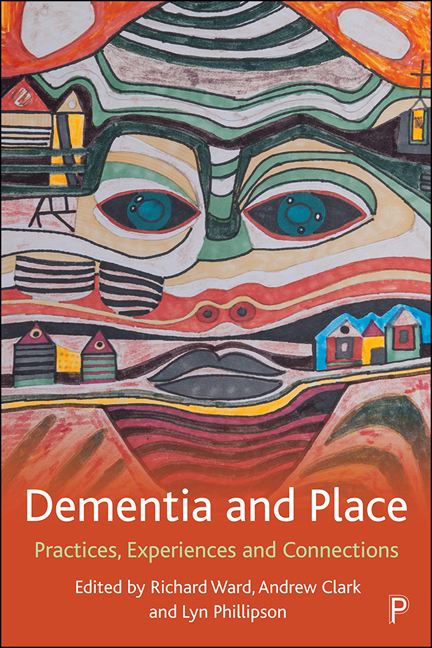Book contents
- Frontmatter
- Dedication
- Contents
- List of figures and tables
- Notes on contributors
- Acknowledgements
- 1 Introduction: Placing dementia
- 2 Understanding the meaning of neighbourhoods for people living with dementia: the value of a relational lens
- 3 Moving house with dementia
- 4 How do people with dementia manage problematic situations in public spaces?
- 5 Making and maintaining neighbourhood connections when living alone with dementia
- 6 My neighbourhood, my future ...?
- 7 Enabling the neighbourhood: a case for rethinking dementia-friendly communities
- 8 A conceptual framework of the person– environment interaction in the neighbourhood among persons living with dementia: a focus on out-of-home mobility
- 9 We’re known as ‘the girls’ around town: support, isolation and belonging for a lesbian couple living with dementia
- 10 Building community capacity for dementia in Canada: new directions in new places
- 11 The good, the challenging and the supportive: mapping life with dementia in the community
- 12 Growing back into community: changes through life with dementia
- 13 Dementia, tourism and leisure: making the visitor economy dementia friendly
- 14 Conclusion: Dementia emplaced
- Index
9 - We’re known as ‘the girls’ around town: support, isolation and belonging for a lesbian couple living with dementia
Published online by Cambridge University Press: 13 May 2022
- Frontmatter
- Dedication
- Contents
- List of figures and tables
- Notes on contributors
- Acknowledgements
- 1 Introduction: Placing dementia
- 2 Understanding the meaning of neighbourhoods for people living with dementia: the value of a relational lens
- 3 Moving house with dementia
- 4 How do people with dementia manage problematic situations in public spaces?
- 5 Making and maintaining neighbourhood connections when living alone with dementia
- 6 My neighbourhood, my future ...?
- 7 Enabling the neighbourhood: a case for rethinking dementia-friendly communities
- 8 A conceptual framework of the person– environment interaction in the neighbourhood among persons living with dementia: a focus on out-of-home mobility
- 9 We’re known as ‘the girls’ around town: support, isolation and belonging for a lesbian couple living with dementia
- 10 Building community capacity for dementia in Canada: new directions in new places
- 11 The good, the challenging and the supportive: mapping life with dementia in the community
- 12 Growing back into community: changes through life with dementia
- 13 Dementia, tourism and leisure: making the visitor economy dementia friendly
- 14 Conclusion: Dementia emplaced
- Index
Summary
My partner Veda and I live in Gerringong, a coastal town of approximately 4,000 people, about two hours south of Sydney, Australia. Gerringong is still a farming area, with dairies and vineyards, but is also a tourist destination because of its beaches. We’re lesbians: we’ve never encountered any discrimination down here. We’re known as ‘the girls’ around town. Being well known in such a small town has been particularly important as Veda's dementia symptoms have progressed since her diagnosis of a rare form of Younger Onset Dementia in 2012 at the age of 61.
Even though I’ve had this house for about 25 years, neither Veda nor I planned to live here in such a full-time way. Veda moved here in 2007 to live with me. Both of us love natural beauty, but also wanted to get to Sydney easily. We liked the idea of a country and a city life. Veda and I have always been travellers. It's something we have in common. We didn't do the usual things that our peers did in their 20s. I went over to France to study and Veda was touring as a member of a rock band.
When I came back from travelling and studying overseas, I lived and worked in the middle of Sydney. It was the ‘80s and there was a vibrant gay and lesbian culture where I lived, but there was also HIV/AIDs. I worked in the education sector, eventually for the state government, with a particular focus on disability and equity. I was called the ‘equity policy queen’, one of ‘the lesbian mafia’. I applied the Anti-Discrimination Act, the Disability Discrimination Act and the Convention on the Rights of People with Disability to state education policy. I’m a speed reader and cope with struggles by learning as much as I can. It turns out that my professional experience and skill have been particularly useful since Veda's diagnosis.
Veda had a completely different history. She started performing as a musician at the age of 15. By 17 she was leading some Adelaide bands and then toured in Australia before going overseas at 20. In Kuala Lumpur she met and joined a women's band.
- Type
- Chapter
- Information
- Dementia and PlacePractices, Experiences and Connections, pp. 135 - 139Publisher: Bristol University PressPrint publication year: 2021



